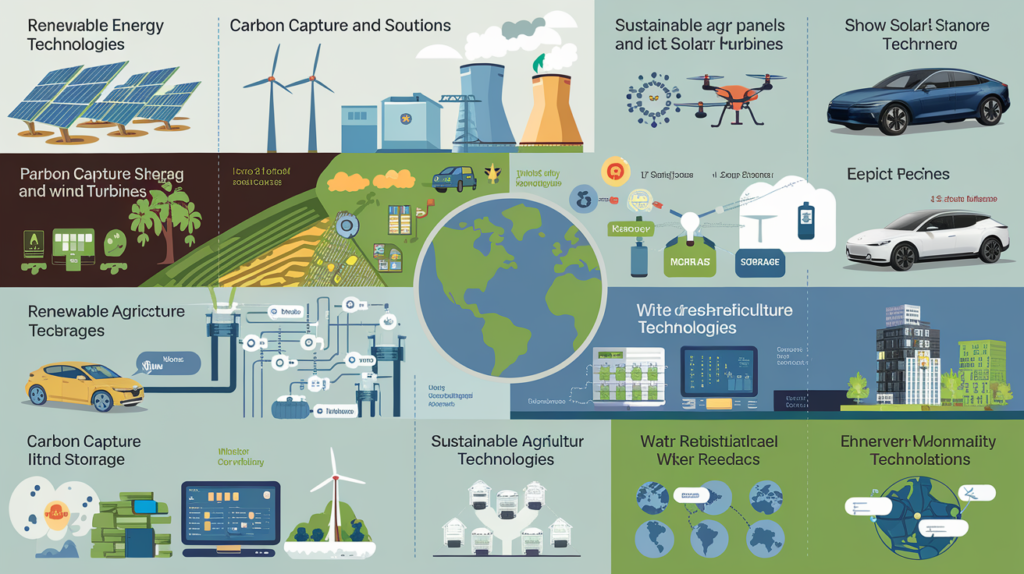Climate change is one of the most pressing issues facing our planet today. As the effects of global warming become increasingly evident, the need for effective climate change solutions has never been more critical. Fortunately, many tech companies fighting climate change are at the forefront of developing innovative strategies and technologies to combat this crisis. This article will explore how technology and climate change intersect and highlight 10 new climate change solutions that could save the planet.

The Role of Technology in Climate Change Solutions
Technology and climate change have a complex relationship. While the tech industry has historically contributed to environmental issues through energy consumption and waste, it is now pivoting to focus on sustainable practices. By harnessing innovative technologies, companies are finding ways to reduce carbon emissions, improve energy efficiency, and promote sustainability. Here are some ways tech companies are leading the fight against climate change:
1. Renewable Energy Technologies
One of the most promising climate change solutions comes from renewable energy technologies. Solar, wind, and hydropower are becoming increasingly viable alternatives to fossil fuels. Tech companies are investing heavily in these sectors to develop more efficient solar panels and wind turbines, making clean energy more accessible. For example, companies like Tesla are not only producing electric vehicles but also developing solar products that help consumers generate their own renewable energy.
2. Carbon Capture and Storage
Carbon capture technology is another innovative climate solution. This technology captures carbon dioxide emissions from sources like power plants and industrial facilities, preventing them from entering the atmosphere. Companies such as Carbon Clean and Climeworks are working on scalable solutions to capture and utilize carbon emissions, transforming them into valuable products.
3. Sustainable Agriculture Technologies
The agricultural sector is a significant contributor to greenhouse gas emissions. Tech companies are developing innovative climate solutions that promote sustainable farming practices. Precision agriculture technologies, including drones and IoT sensors, help farmers optimize resource use and reduce waste. By monitoring soil health and water usage, these technologies can significantly lower emissions associated with food production.
4. Energy Storage Solutions
As renewable energy sources like solar and wind become more prevalent, efficient energy storage solutions are crucial for balancing supply and demand. Companies like QuantumScape and A123 Systems are advancing battery technologies to store renewable energy more effectively. Improved energy storage can help mitigate the intermittency issues associated with renewable energy, making it a more reliable option for consumers and businesses alike.
5. Smart Grids
Smart grids leverage technology to improve electricity distribution and consumption. By integrating renewable energy sources and optimizing energy flow, smart grids reduce waste and enhance energy efficiency. Companies like Siemens and GE are at the forefront of developing smart grid solutions that facilitate the transition to a more sustainable energy future.
6. Electric Vehicles
The transportation sector is a major contributor to climate change, but electric vehicles (EVs) offer a promising alternative. Tech companies fighting climate change, such as Tesla and Rivian, are leading the charge in developing electric vehicles that produce zero tailpipe emissions. As charging infrastructure improves and battery technology advances, EVs are becoming more practical for everyday consumers, significantly reducing reliance on fossil fuels.
7. Sustainable Building Technologies
Building construction and operation contribute to a significant portion of global emissions. Innovative technologies, such as green building materials and energy-efficient systems, are crucial for reducing the environmental impact of construction. Companies like Interface and Kingspan are pioneering sustainable building technologies that lower energy consumption and minimize waste.
8. Water Conservation Technologies
Water scarcity is another critical issue exacerbated by climate change. Tech companies are developing solutions to improve water efficiency and management. Innovations such as smart irrigation systems and water recycling technologies help conserve water and ensure its sustainable use, particularly in agriculture and urban settings.
9. Climate Risk Analytics
Understanding the risks associated with climate change is essential for businesses and governments. Companies like Jupiter Intelligence are providing advanced analytics tools to assess climate risks and inform decision-making. These tools enable organizations to develop strategies that mitigate the impacts of climate change on their operations and investments.
10. Environmental Monitoring Technologies
Finally, effective climate change solutions require accurate data and monitoring. Companies like Planet Labs and Blue Sky Network are utilizing satellite imagery and remote sensing technologies to monitor environmental changes in real time. This data helps researchers and policymakers make informed decisions about climate action.
Conclusion
As the world faces the urgent challenge of climate change, tech companies are stepping up with innovative climate solutions that can significantly impact the fight against global warming. From renewable energy technologies to carbon capture and sustainable agriculture, the intersection of technology and climate change is driving progress toward a more sustainable future. By supporting these initiatives and adopting cleaner technologies, we can collectively work towards a healthier planet.
Ultimately, embracing these climate change solutions is not just a responsibility but an opportunity for innovation and growth in the tech industry. Together, we can make a difference and pave the way for a sustainable future.


























